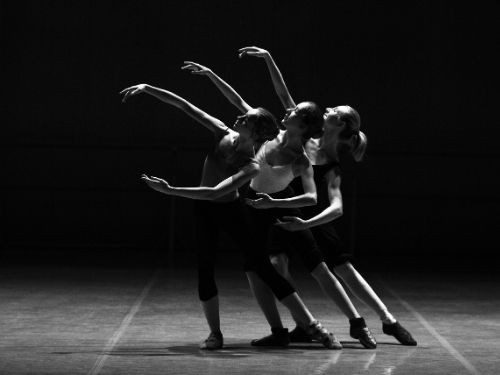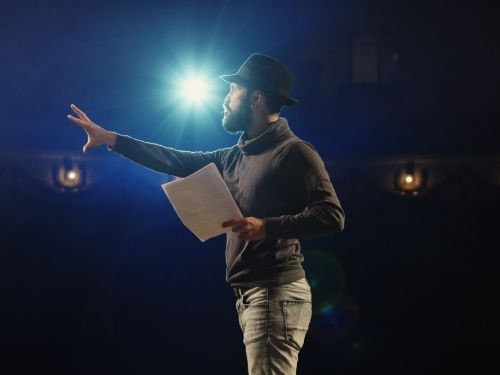How to become an Actor
This article provides in-depth information into What is an Actor? What Actors do? Degrees for Actors, Steps to become Actor and much more.
An Actor's job is to portray the character they play and connect with the audience while conveying a story in a movie, play, theater or a television show. This article aims at giving you information on how to become an actor with systematic steps.
What does Actor do ?
An actor or actress must be persistent and consistent with the efforts they put towards building his career.
They represent the character in a realistic way to express and convey the emotions involved. They usually research about the character’s interest, hobbies and the style to depict the same on the frame. It is also important to have a good physical appearance as actors and actresses usually undergo physical transformations to make the character look real.
Steps for becoming Actor
1
Theater In High School
Your journey to an acting career can initially begin by participating at high school theater events, plays and music. Students get exposure as they perform in plays, write their own scripts, design costumes, and develop skills by enacting in front of a large audience. You also learn to face preliminary auditions that enhance your confidence for countless auditions in the professional world. This also helps you to figure out if the acting career is right for you.

2
Gain Experience
Auditioning for roles for a play at the local area or theaters could add up your skills. Even a small role could help you gain experience behind the curtains and the various methods of acting. This is essential in the long run.

3
Get An Education
A formal college education is not mandatory to be a successful actor or actress, however, college education aspires performers to develop skills in acting, technicality about the profession, and behind the scenes. You can choose the post-secondary programs for drama in most public and private colleges in the United States including the community colleges to learn about the acting skills, how the business dealing works and contracts. Production programs sponsored by college helps producers to hunt for new young talent. An art academy could motivate you better towards your profession.

4
Practice For Perfection
cting requires perfection in the role you play and this is achieved by rigorous practice. Practicing on your acting skills will help you get an hands-on experience to become a professional. It is advised to gain as much experience to express better. Small playhouses, theaters and workshops give a great environment for performers to practice their talent.
Networking plays a vital role in this profession and joining a theater team makes way to build contacts with people.

5
Build A Resume
Building an effective resume for an acting career is important, it could give you a great start. Its details about the various roles you played and the experience at theaters, music videos, a commercial.

6
Hire An Agent
As you enter the professional world, it's time you hire an experienced agent. An agent helps you to build a good network, avoid mistakes, get you more opportunities for vivid roles and auditions. An agent helps you to become a successful actor or actress at a higher level with less time.

Actor Degree Levels
Associate
Students can choose Acting and Theater as a core topic who pursue an associate degree. The course is for a period of two years and targets the classes for acting students with general education. It is a stepping stone for actors and some courses offered are general communication, history, literature. Courses like the Fundamental of Acting include characterization, memorizing dialogues, improvisation.
History of cinema
- This is a course offered to understand the evolution of the films from 1896 to the present day. It also concentrates on the appreciation of cinemas, themes, genres, and more.
Objectives
-
Understanding the history and making of cinemas
-
Analysis of the basics of film
-
The narrative structure
-
Learns about the various film making techniques
-
The relation between the film and literature
-
Analyze about the behind-the-scene roles
Basic costume construction
-
Course offered to introduce costume designing and the basic principle of theoretical designing and psychology of clothing. Research on designing appropriate costumes to add production value.
Objectives
-
Practical and theoretical knowledge on designing a costume
-
Learns stitching and sewing work
-
Costume construction
-
Operation of machines
Entertainment career
-
Students are given wide exposure to various career options to enhance their performing skills.
Objectives
-
Effective resume building
-
Portfolio preparation
-
Audition and interview techniques
-
Different method of acting
Acting fundamentals
- This course provides the basic vocabulary of acting with various approaches to create a character. Students also learn to improvise the character at circumstances and actions. It is also a foundational course for theater minors and majors.
Objectives
-
Exploring and observe the character to play
-
Acting techniques
-
Expressing and interacting through the lens
-
Memorizing the script and improvising the character.
Bachelors
Bachelor's degree for students interested in acting and fine arts is a liberal program to motivate students towards their passion. This is a four-year program that offers general education with the fine arts program. Some courses under it are theater history, acting skills, and dramatic techniques.
Dramatic technique
- This helps students to be creative, expressive with physical coordination, postures, communication skills, voice modulation during dialogue delivery and other practical training in this course.
Objectives
- Stronger teacher-student relationship
- Inherit proper physical postures and characters of the role
- Project voice to mass
- Implementing physical movements of the character to bring it to life
Shakespeare text
-
This course aims at making students comfortable with the Shakespeare text and demands of the performance.
Objectives
- Conveying the story clearly
- Spontaneity in acting
- Analysing the scripts from literature to spoken words
Performance projects
-
This course gives students a topic and the performance is practiced within their own scripts, production, costumes and other. This helps students to grasp the historical and practical skills on the play they enact.
Objectives
- Take responsibility and teamwork
- Stage management
- Practical knowledge on cultural subjects.
- Casting and directing for the performance.
Audition workshop
- These workshops are organized to strengthen the skills of the students for professional careers. This helps the students to analyze their strengths, weaknesses and areas for improvisation.
Objectives
- How to interact during the audition
- Improvisation based on the character requirements
- Interaction with the camera
- Express better through the lens
Masters
A Master’s program in Acting helps students to specialize in a particular topic of their choice such as writing, directing, acting or design(stage, costume or lighting). This program takes about two to three years to complete. Some of the courses for your interests are American theater, scene designing, scripting, and business on stage.
Traditions in American theater
- This course deals with the historical survey of theaters in America from the colonial period of the 21st century. It also specifies about the lectures and discussion of the award-winning plays and actors.
Objectives
- Learning the history and culture of American theaters
- Connecting the present theaters with the history of the theater
- New techniques for the theater
Bringing scripts to life
-
This course guides students about the method of writing a good script. Scripts are the mode of conveying the story during their performance and can bring the character to life.
Objectives
- Drafting same scripts with various approaches
- Experimenting with the sentences
Dramatic interpretation
-
Students are taught about how to create a perfect scene for play or a song and interpret the real emotions to be conveyed to the audience. This helps in getting a good performance over all.
Objectives
- Interpreting a scene in various techniques
- Working on improvising a scene
- Picturising the scene to make it more appealing to the audience, directors.
Practical business on the stage
-
This course is to give practical knowledge of the business of the stage, this includes the production, business dealing, contract. It is basically a course to deal with the technicality behind the stage.
Objectives
- Understanding business contracts
- Approaching the agents
- Technical support system off stage
Doctorate
Most students prefer the PhD programs in acting over the master's degree program. It usually takes six years to study the program with flexible courses and credits. This program offers specific topics of the theater for interested students such as the history of theater and the various roles. PhD is best for students who want to master a particular area or an acting style. Some of the courses offered under this program are Cultural influence, Humor in tragedy, ancient theater.
Celebrity and theories of performance
- This course is to combine the acting skills with cognitive science to make it better through the eyes of the audience. This focuses on psychology and the influence a celebrity brings to the role.
Objectives
- Design elements of the theater
- Expertise in the theoretical literature
- Analyze the psychology of the audience
Cross influence of theater
-
This course trains students about how to influence the audience according to various cultures. A play performed in China is different from the same play performed in the United States. This is due to cultural changes.
Objectives
- Understanding the psychology of the audience based on social culture
- Analyze international aesthetics
Cognitive approaches to the arts
-
To make students understand the importance of strengths and weaknesses of the performance by researching and exploring the script of a play. This helps in improvising and investigating those weaknesses.
Objectives
- Researching about the strength and weak spots
- Analyze the approaches for improvising to seek a broad audience.
Use of humor in tragedy
- Adding humor at a tragic scene is an out-of-the-box element. This course helps students to know about the importance of adding humor to a tragic play and how this method shines over the years while conveying sorrow.
Objectives
- Learning the balance between the sorrow and humor
- Importance of laughter
Job concentration
Educating yourself in the theaters doesn't only fetch you the job of an actor or actress but also other career concentrations such as,
Acting coach
An acting coach is a well-versed person who trains and mentors the performers with various methods and techniques of acting. He helps the performers bring the character to life and improvise their role. An acting coach could earn about $28,000 to $40,000 per year.
Set designer
From the courses taken by theater students, they could also be a set designer who is responsible for creating the theater, film or television scenery. A set designer works closely with the director and producer and works towards the architecture and aesthetics of the set.
The average annual income of the set designer is about $43,000.
Director
A director is one who directs the making of a film. He visualizes the screenplay of the various aspects of film and guides the technical crew and actors to fulfill that vision.
The annual income of a director is about $60,000 per year for a fresher.
Producer
A Producer is one who handles the financial flow and budget of a film, he manages the aspects such as selecting the script, Arranging finance, editing and other creative decisions.
A producer can be independent or from a production company and the average salary ranges from $40,000 to $90,000 annually.
Stand Out skills for an actor
Actors work hard to become successful in their profession. It takes genuine effort to develop skills and professionalism. An actor must possess certain outstanding skills to excel at his career and here are some skills listed,
Skillful communication: Communication is an important aspect of acting to express and connect with the audience. Excellent verbal and non-verbal communication drags the audience towards his talent.
Creative nature: With great imagination and creativity in this profession an actor can easily stand out. The flow of artistic ideas in writing, dancing talking, how the character can be improvised, all comes under his own creativity
Memorization skills: Memorizing the long scripts to have an unbroken scene is the skills required for an actor and this is acquired from continuous practices. This gives him a hands-on good dialogue delivery.
Good Physical stamina: The acting profession requires hours-long practice and many rehearsal sessions. Hence, you must be enthusiastic and have good physical stamina to support your dream. While you perform on a live stage, you must have the stamina to act for several hours on stage without losing your stamina.
Perseverance: It is the key for an actor. He must be persistent with the roles and opportunities he gets. A consistent effort is required and actors must keep trying for their betterment. Actors must also develop skills such as spontaneity, adaptability, dedication and self-confidence to be successful in their career.